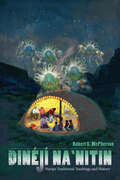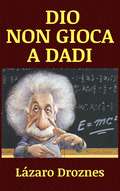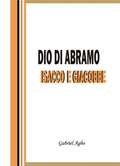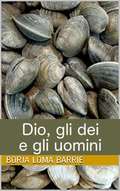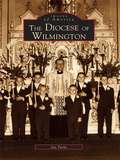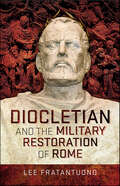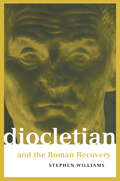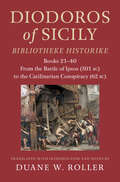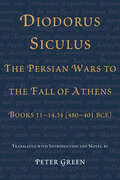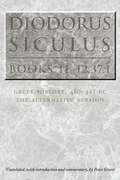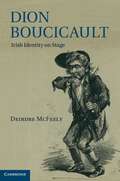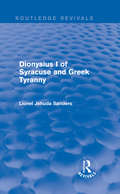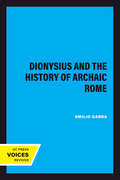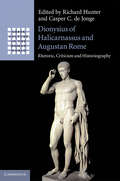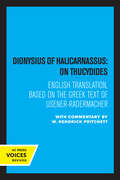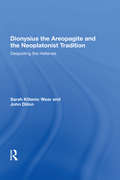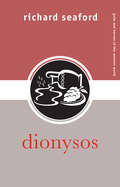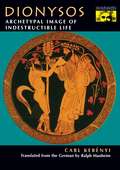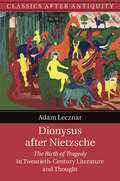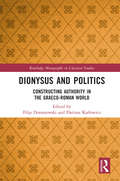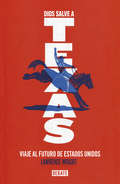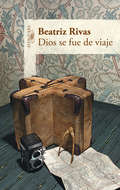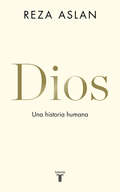- Table View
- List View
Dinéjí Na`nitin: Navajo Traditional Teachings and History
by Robert S. McPhersonTraditional teachings derived from stories and practices passed through generations lie at the core of a well-balanced Navajo life. These teachings are based on a very different perspective of the physical and spiritual world than that found in general American culture. Dinéjí Na`nitin is an introduction to traditional Navajo teachings and history for a non-Navajo audience, providing a glimpse into this unfamiliar domain and illuminating the power and experience of the Navajo worldview. Historian Robert McPherson discusses basic Navajo concepts such as divination, good and evil, prophecy, and metaphorical thought, as well as these topics' relevance in daily life, making these far-ranging ideas accessible to the contemporary reader. He also considers the toll of cultural loss on modern Navajo culture as many traditional values and institutions are confronted by those of dominant society. Using both historical and modern examples, he shows how cultural change has shifted established views and practices and illustrates the challenge younger generations face in maintaining the beliefs and customs their parents and grandparents have shared over generations. This intimate look at Navajo values and customs will appeal not only to students and scholars of Native American studies, ethnic studies, and anthropology but to any reader interested in Navajo culture or changing traditional lifeways.
Dio Non Gioca a Dadi: Vita e opere di Albert Einstein, lo scienziato più famoso del XX secolo
by Lazaro DroznesDio non gioca a dadi Vita e opera di Albert Einstein, lo scienziato più famoso del XX secolo. La vita di Albert Einstein riassume il progresso della scienza del XX secolo e le conseguenze sullo sviluppo dell'umanità, in particolare sulla guerra e nelle relazioni internazionali. Questa storia drammatica racconta la vita di Einstein in 4 parti essenziali della sua carriera. Einstein lavora all'ufficio brevetti e marchi di Berna.È uno scienziato sconosciuto che non è riuscito a trovare un posto da insegnante in nessuna università. A soli 25 anni e con una serie di esperimenti mentali scopre la Teoria Speciale della Relatività, la prima pietra miliare della fisica teorica del XX secolo Albert Einstein e Niels Bohr discutono sulla validità della meccanica quantistica. Einstein ne accetta la validità ma rifiuta di accettare l'incertezza che tale teoria propone e insiste su una teoria integrale che spieghi l'Universo mediante una legge di cause ed effetti. Einstein ha deciso di inviare una lettera a Franklin Delano Roosevelt con la proposta di sviluppare la bomba atomica prima dei tedeschi. I suoi suggerimenti vengono ascoltati e l'America diventa la prima potenza nucleare. Scoppia l'isteria di McCarthy. da Einstein per avere consigli sulla strategia migliore per affrontare la situazione. Comprate ora questo libro per scoprire i costumi della vita dello scienziato più importante del XX secolo!
Dio di Abramo, Isacco e Giacobbe
by Gabriel AgboLe promesse dell’alleanza di Dio non falliscono. Questo libro è stato scritto per aiutarti a ottenere le promesse di Dio per la tua vita. È uno studio attento e elaborato, con testimonianze personali, sulla capacità e volontà di Dio di eseguire tutte le sue parole su di noi. Disse che veglierà sulle sue parole perché si avverino.- Qui, guarderemo in modo critico le dinamiche di una promessa divina; com’è stabilita, mantenuta fino alla sua realizzazione. Ogni promessa ha un inizio, tempistica e condizioni. Dobbiamo sempre essere in grado di entrare perfettamente e comodamente nella volontà di Dio per la nostra vita. Veramente, tutto questo è possibile con Dio!
Dio, gli dei e gli uomini
by Borja Loma BarrieStoria del più grande poeta di Roma e del più grande religioso giudeo. Romanzo storico. Biografie dello scrittore latino Orazio e del religioso giudeo Giovanni Battista. Racconto delle loro rispettive epoche e vicissitudini, come il battesimo di Gesù Cristo, l'invasione romana della Palestina e l'assassinio di Giulio Cesare.
Diocese of Wilmington, The
by Jim ParksThe Catholic faith was first brought to the peninsula that lies betweenthe Chesapeake and Delaware Bays in the seventeenth century by Jesuitpriests who rode circuit from the Maryland colony, offering Mass and bringingthe sacraments to private homes. As the country grew, so too did the Catholiccommunity on Delmarva, and many new churches and missions were founded.From the earliest established church--St. Francis Xavier Mission in CecilCounty, Maryland, founded in 1704--to Salesianum School, the first highschool in Delaware to be racially integrated, from the involvement in the dioceseof American saints John Neumann and Elizabeth Ann Seton to a variety ofreligious orders and organizations, these honored institutions and remarkableindividuals helped to shape the minds and spirits of young and old alikeThe story of the Diocese of Wilmington, which split off from the Diocese ofPhiladelphia in 1868, is not just one of church construction dates--it is the storyof its people. From the colorful settlement of French exiled after a slave rebellionin Haiti to the New World immigrants of Irish, German, Italian, Polish, andlater, Hispanic descent, the Catholic community in the region has been diverse,vibrant, and steadfast in a shared faith. From its humble beginnings, the diocesehas grown to serve a population of more than 190,000 members with 56 parishes,20 missions, and 37 schools and has fostered a strong civic tradition in athletics,theater, and community festivals.
Diocletian and the Military Restoration of Rome
by Lee FratantuonoThe third century AD was one of unprecedented crisis and chaos for the Roman Empire. Nightmares both internal and external threatened to spell the end of Rome’s thousand-year history. Diocletian was born either a slave or a freedman, and he grew up to become the savior of Rome in her hour of crisis, a powerful military and political leader who transformed the Roman Empire from a hotbed of unceasing strife and turmoil into a renewed, restored, revivified and stable polity. His more than twenty years of power were marked by the ill-fated Great Persecution of the Christians, an undertaking that would prove to be one of the less successful initiatives of his reign, even as in its own way it helped to pave the way for the coming of an equally famous, successful emperor in the person of Constantine the Great. The present study seeks to provide an introduction to the life and times of Diocletian for the general reader, offering a balanced portrait of an immensely talented man in a time of trial and tumult, an accomplished emperor who knew when it was time to retire to his gardens.
Diocletian and the Roman Recovery (Roman Imperial Biographies)
by Stephen WilliamsFirst published in 1997. Routledge is an imprint of Taylor & Francis, an informa company.
Diocletian and the Roman Recovery (Roman Imperial Biographies)
by Stephen WilliamsStephen Williams's book is the first biography of Diocletian to appear in English. It combines the historical narrative of his remarkable reign and those of his fellow-emperors, with a chapter-by-chapter study of each of the great problems he faced, the interlocking solutions he evolved to meet them, and the longer term results. It is both a portrait of one of Rome's greatest and most original rulers, and a political study in the emergence of Absolutism. Also includes four maps.
Diodoros of Sicily: Books 21-40: From the Battle of Ipsos (301 BC) to the Catilinarian Conspiracy (62 BC)
by Duane W. RollerDiodoros' Bibliotheke Historike, written in the last half of the first century BC, is a major source for ancient history from earliest times to his own era. This is the first English translation of Books 21-40 (301-62 BC) in seventy years, and the first ever commentary on those portions of the text. Major topics include the history of Sicily, the career of Hannibal, the slave wars that plagued the era, and the increasing instability of the Roman Republic. Diodoros' insight into the events of these years is a major source for that era, but his account, which survives only in fragments excerpted and to some extent paraphrased by later Byzantine scholars, has long been neglected.
Diodorus Siculus the Persian Wars to the Fall of Athens: Books 11–14.34 (480–401 BCE)
by Peter GreenOnly one surviving source provides a continuous narrative of Greek history from Xerxes' invasion to the Wars of the Successors following the death of Alexander the Great--the Bibliotheke, or "Library," produced by Sicilian historian Diodorus Siculus (ca. 90-30 BCE). Yet generations of scholars have disdained Diodorus as a spectacularly unintelligent copyist who only reproduced, and often mangled, the works of earlier historians. Arguing for a thorough critical reappraisal of Diodorus as a minor but far from idiotic historian himself, Peter Green published Diodorus Siculus, Books 11-12. 37. 1, a fresh translation, with extensive commentary, of the portion of Diodorus's history dealing with the period 480-431 BCE, the so-called "Golden Age" of Athens. This is the only recent modern English translation of the Bibliotheke in existence. In the present volume--the first of two covering Diodorus's text up to the death of Alexander--Green expands his translation of Diodorus up to Athens' defeat after the Peloponnesian War. In contrast to the full scholarly apparatus in his earlier volume (the translation of which is incorporated) the present volume's purpose is to give students, teachers, and general readers an accessible version of Diodorus's history. Its introduction and notes are especially designed for this audience and provide an up-to-date overview of fifth-century Greece during the years that saw the unparalleled flowering of drama, architecture, philosophy, historiography, and the visual arts for which Greece still remains famous.
Diodorus Siculus, Books 11-12.37.1: Greek History 480-431 B.C.--The Alternative Version
by Peter GreenSicilian historian Diodorus Siculus (ca. 100-30 BCE) is our only surviving source for a continuous narrative of Greek history from Xerxes' invasion to the Wars of the Successors following the death of Alexander the Great. Yet this important historian has been consistently denigrated as a mere copyist who slavishly reproduced the works of earlier historians without understanding what he was writing. By contrast, in this iconoclastic work Peter Green builds a convincing case for Diodorus' merits as a historian. Through a fresh English translation of a key portion of his multi-volume history (the so-called Bibliotheke, or "Library") and a commentary and notes that refute earlier assessments of Diodorus, Green offers a fairer, better balanced estimate of this much-maligned historian. The portion of Diodorus' history translated here covers the period 480-431 BCE, from the Persian invasion of Greece to the outbreak of the Peloponnesian War. This half-century, known as the Pentekontaetia, was the Golden Age of Periclean Athens, a time of unprecedented achievement in drama, architecture, philosophy, historiography, and the visual arts. Green's accompanying notes and commentary revisit longstanding debates about historical inconsistencies in Diodorus' work and offer thought-provoking new interpretations and conclusions. In his masterful introductory essay, Green demolishes the traditional view of Diodorus and argues for a thorough critical reappraisal of this synthesizing historian, who attempted nothing less than a "universal history" that begins with the gods of mythology and continues down to the eve of Julius Caesar's Gallic campaigns.
Diogenes Laertius
by Tiziano DorandiThis edition presents a radically improved text of Diogenes Laertius Lives of Eminent Philosophers. The text is accompanied by a three level apparatus. A lengthy introduction list all the manuscripts of Diogenes Lives and discusses its transmission in Late Antiquity and Medieval and Renaissance Periods. There is also a index of personal names, a bibliography and some notes which cover several features of the text and its interpretation. Tiziano Dorandi has used the Nachlass of Peter Von der Muhll, for the first time in its entirety, to verify and consolidate material that he had previously gathered. This is by far the most detailed and elaborate edition which Diogenes Lives a work unique in his kind, and which has had a profound influence on European literature and philosophy has ever received
Dion Boucicault
by Deirdre McfeelyDeirdre McFeely presents the first book-length critical study of Dion Boucicault, placing his Irish plays in the context of his overall career. The book undertakes a detailed examination of the reception of the plays in the New York-London-Dublin theatre triangle which Boucicault inhabited. Interpreting theatre history as a sociocultural phenomenon that closely approximates social history, McFeely examines the different social and political worlds in which the plays were produced, demonstrating that the complex politics of reception of the plays cannot be separated from the social and political implications of colonialism at that time. The study argues for a shift in focus from the politics of the plays, and their author, to the politics of the auditorium and the press, or the politics of reception. It is within that complex and shifting field of stage, theatre and public media that Boucicault's performance as playwright, actor and publicist is interpreted.
Dionysius I of Syracuse and Greek Tyranny (Routledge Revivals)
by Lionel Jehuda SandersProfessor Sanders’ full-length study of Dionysius I, one of the most powerful figures of fourth-century BC Greece, is the first to appear in English, and marks an important reassessment of the ‘tyrant’ of Syracuse. Dionysius I regularly appears in the surviving historical accounts as a tyrant in the worst – modern – sense of the word: cruelty, intransigence, arrogance are all part of this stereotype. Yet here is a ruler who, according to the ancient testimony, was deeply concerned with the establishment of a just regime and to whom Plato turned to found the ideal Republic. The hostile picture of Dionysius that has come down to us is basically Athenian, Sanders argues, deriving from political circles engaged in propaganda aimed at tarnishing the tyrant’s reputation. Dionysius I of Syracuse and Greek Tyranny will be of interest to those engaged with the history, historiography and political practice of the ancient world.
Dionysius and The History of Archaic Rome (Sather Classical Lectures #56)
by Emilio GabbaIn The History of Archaic Rome, Dionysius purposely viewed Roman history as an embodiment of all that was best in Greek culture. Gabba places Dionysius's remarkable thesis in its cultural context, comparing this author with other ancient historians and evaluating Dionysius's treatment of his sources.In truth, the last decades B.C. made the historian's task an enormous challenge. On the one hand, the ancient writers knew Rome to be the greatest empire the world had seen, seemingly impregnable in military power and still capable of expansion. On the other hand, they were acutely aware that it recently had barely survived half a century of civil strife.Gabba recalls to us how little was confidently known of Rome's actual origins in an illuminating examination of Dionysius's methodology as a historian.
Dionysius of Halicarnassus and Augustan Rome: Rhetoric, Criticism and Historiography (Greek Culture in the Roman World)
by Richard Hunter Casper C. de JongeThe Greek author Dionysius of Halicarnassus came to Rome in 30/29 BC. He learnt Latin, developed a network of students, patrons and colleagues, and started to teach rhetoric. He published a history of early Rome (Roman Antiquities), and essays on rhetoric and literary criticism, including On the Ancient Orators, On Composition, and several letters. This volume examines how Dionysius' critical and rhetorical works are connected with his history of Rome, and the complex ways in which both components of this dual project - rhetorical criticism and historiography - fit into the social, intellectual, literary, cultural and political world of Rome under Augustus. How does Dionysius' interpretation of the earliest Romans resonate with the political reality of the Principate? And how do his views relate to those of Cicero, Livy and Horace? This volume casts new light on ancient rhetoric, literary criticism, historiography and the literary culture of Augustan Rome.
Dionysius of Halicarnassus: Based on the Greek Text of Usener-Radermacher
by W. Kendrick PritchettThis title is part of UC Press's Voices Revived program, which commemorates University of California Press’s mission to seek out and cultivate the brightest minds and give them voice, reach, and impact. Drawing on a backlist dating to 1893, Voices Revived makes high-quality, peer-reviewed scholarship accessible once again using print-on-demand technology. This title was originally published in 1975.
Dionysius the Areopagite and the Neoplatonist Tradition: Despoiling the Hellenes (Ashgate Studies In Philosophy And Theology In Late Antiquity)
by Sarah Klitenic Wear'Dionysius the Areopagite' is arguably one of the most mysterious and intriguing figures to emerge from the late antique world. Writing probably around 500 CE, and possibly connected with the circle of Severus of Antioch, Dionysius manipulates a Platonic metaphysics to describe a hierarchical universe: as with the Hellenic Platonists, he arranges the celestial and material cosmos into a series of triadic strata. These strata emanate from one unified being and contain beings that range from superior to inferior, depending on their proximity to God. Not only do all things in the hierarchy participate in God, but also all things are inter-connected, so that the lower hierarchies fully participate in the higher ones. This metaphysics lends itself to a sacramental system similar to that of the Hellenic ritual, theurgy. Theurgy allows humans to reach the divine by examining the divine as it exists in creation. Although Dionysius' metaphysics and religion are similar to that of Iamblichus and Proclus in many ways, Pseudo-Dionysius differs fundamentally in his use of an ecclesiastical cosmos, rather than that of the Platonic Timaean cosmos of the Hellenes. This book discusses the Christian Platonist's adaptation of Hellenic metaphysics, language, and religious ritual. While Dionysius clearly works within the Hellenic tradition, he innovates to integrate Hellenic and Christian thought.
Dionysos (Gods and Heroes of the Ancient World)
by Richard SeafordCovering a wide range of issues which have been overlooked in the past, including mystery, cult and philosophy, Richard Seaford explores Dionysos – one of the most studied figures of the ancient Greek gods. Popularly known as the god of wine and frenzied abandon, and an influential figure for theatre where drama originated as part of the cult of Dionysos, Seaford goes beyond the mundane and usual to explore the history and influence of this god as never before. As a volume in the popular Gods and Heroes series, this is an indispensible introduction to the subject, and an excellent reference point for higher-level study.
Dionysos: Archetypal Image of Indestructible Life (Bollingen Series (General) #636)
by Carl KerényiNo other god of the Greeks is as widely present in the monuments and nature of Greece and Italy, in the sensuous tradition of antiquity, as Dionysos. In myth and image, in visionary experience and ritual representation, the Greeks possessed a complete expression of indestructible life, the essence of Dionysos. In this work, the noted mythologist and historian of religion Carl Kerényi presents a historical account of the religion of Dionysos from its beginnings in the Minoan culture down to its transition to a cosmic and cosmopolitan religion of late antiquity under the Roman Empire. From the wealth of Greek literary, epigraphic, and monumental traditions, Kerényi constructs a picture of Dionysian worship, always underlining the constitutive element of myth. Included in this study are the secret cult scenes of the women's mysteries both within and beyond Attica, the mystic sacrificial rite at Delphi, and the great public Dionysian festivals at Athens. The way in which the Athenian people received and assimilated tragedy in its immanent connection with Dionysos is seen as the greatest miracle in all cultural history. Tragedy and New Comedy are seen as high spiritual forms of the Dionysian religion, and the Dionysian element itself is seen as a chapter in the religious history of Europe.
Dionysus after Nietzsche: The Birth of Tragedy in Twentieth-Century Literature and Thought (Classics after Antiquity)
by Adam LecznarDionysus after Nietzsche examines the way that The Birth of Tragedy (1872) by Friedrich Nietzsche irrevocably influenced twentieth-century literature and thought. Adam Lecznar argues that Nietzsche's Dionysus became a symbol of the irrational forces of culture that cannot be contained, and explores the presence of Nietzsche's Greeks in the diverse writings of Jane Harrison, D. H. Lawrence, Martin Heidegger, Richard Schechner and Wole Soyinka (amongst others). From Jane Harrison's controversial ideas about Greek religion in an anthropological modernity, to Wole Soyinka's reimagining of a postcolonial genre of tragedy, each of the writers under discussion used the Nietzschean vision of Greece to develop subversive discourses of temporality, identity, history and classicism. In this way, they all took up Nietzsche's call to disrupt pre-existing discourses of classical meaning and create new modes of thinking about the Classics that speak to the immediate concerns of the present.
Dionysus and Politics: Constructing Authority in the Graeco-Roman World (Routledge Monographs in Classical Studies)
by Filip DoroszewskiThis volume presents an essential but underestimated role that Dionysus played in Greek and Roman political thought. Written by an interdisciplinary team of scholars, the volume covers the period from archaic Greece to the late Roman Empire. The reader can observe how ideas and political themes rooted in Greek classical thought were continued, adapted and developed over the course of history. The authors (including four leading experts in the field: Cornelia Isler-Kerényi, Jean-Marie Pailler, Richard Seaford andRichard Stoneman) reconstruct the political significance of Dionysus by examining different types of evidence: historiography, poetry, coins, epigraphy, art and philosophy. They discuss the place of the god in Greek city-state politics, explore the long tradition of imitating Dionysus that ancient leaders, from Alexander the Great to the Roman emperors, manifested in various ways, and shows how the political role of Dionysus was reflected in Orphism and Neoplatonist philosophy. Dionysus and Politics provides an excellent introduction to a fundamental feature of ancient political thought which until now has been largely neglected by mainstream academia. The book will be an invaluable resource to students and scholars interested in ancient politics and religion.
Dios salve a Texas: Viaje al futuro de Estados Unidos
by Lawrence WrightLa exploración de uno de los estados más controvertidos de Norteamérica desde la penetrante mirada y el humor de un nativo. Las botas, las camionetas, las armas, la actitud... El estado de la Estrella Solitaria está definido por una serie de estereotipos que suelen constituir en su conjunto una farsa. De esencia tradicionalmente republicana, conocido en todo el mundo por su industria petrolera y su vinculación a la Asociación Nacional del Rifle, Texas es también uno de los territorios más diversos de la nación estadounidense. Las grandes ciudades, cuyas minorías ya conforman grandes grupos étnicos, son de mayoría demócrata y en pocos años el estado ha logrado superar a California en exportaciones tecnológicas. Sin embargo, muchos son los que afirman que Texas es responsable de propugnar la cultura política de Donald Trump. En una insuperable mezcla de crónica periodística, clase magistral de historia y memorias personales, el Pulitzer Lawrence Wright nos ofrece un profundo retrato del que posiblemente es uno de los estados más controvertidos y complejos de Estados Unidos. En estas páginas, no solo se describe el corazón de Trumpland, sino que también se nos muestra una faceta oculta que puede darnos las claves para entender el futuro que se está escribiendo en el seno de la sociedad norteamericana. Reseñas: «Magnífico, el trabajo más personal de Wright hasta la fecha. Es una elegante mezcla de autobiografía y crónica periodística, libre de prejuicios elitistas por un lado y pronunciamientos concisos por el otro.»The New York Times Book Review «Convincente y oportuno. Hay un gigante dormido en Texas y Wright logra capturar tanto la frustración como la esperanza que invaden al estado cada vez que este hace el más mínimo movimiento.»The Washington Post «Fascinante. Sea cual sea tu opinión sobre el estado de Texas, en estas páginas seguro que encontrarás un libro ameno e informativo que habla de un lugar peculiar como no hay otro en la Tierra.»New York Journal of Books «Wright es un escritor texano, un anecdotista que, aunque deambula por sus textos especificando solo ocasionalmente dónde quiere ir a parar, siempre conduce al lector a su destino. En su voz se identifica a un verdadero escritor neoyorquino y, en su prosa, una informalidad pulcra y agradable.»The Guardian «Su gran sensibilidad se adecúa perfectamente al tema de su última obra y le ayuda a capturar una imagen de Texas al completo, en su suerte y su desgracia.»The New York Times
Dios se fue de viaje (Mapa de las lenguas #Volumen)
by Beatriz RivasDios se fue de viaje es la historia de dos mujeres de diferentes épocas que no obstante, tienen una conexión: la de defender su libertad. ¿No será que Dios se ha ido a un largo viaje y no planea regresar? Esta es una novela épica, amorosa, íntima, seductora... los lectores agradecerán tenerla en sus manos y jamás podrán olvidarla. Entre Cirey en 1735 y París en 1934, ocurre el éxodo de cuatro amantes que un día abrieron los ojos y descubrieron que Dios (si es que en verdad existe), tan pronto creó el mundo, tomó su veliz y se fue de viaje, quizá para nunca más volver, dejando tras de sí un mundo de inequidades, prejuicios, violencia, miseria e ignorancia. Impidiendo el tránsito de la historia feliz de una humanidad que no acaba de entender que ahora Dios está escondido en el conocimiento, en la ciencia, en la razón y en la lucha por la conquista de los ideales como la libertad y un amor a prueba decasi todo. Entre Émilie du Châtelet y Gerda Taro existen varios vínculos sutiles y uno evidente: ambas son defensoras de su propia libertad y aman y se dejan amar con vehemencia para poder encontrarse. La primera, rindiéndose a la voluptuosa inteligencia de Voltaire, desterrándose por voluntad propia para estudiar, junto con él, las ecuaciones del universo y el espíritu; la segunda, supeditando el obturador de su gitano Robert Capa a un ideal de igualdad en medio de los horrores del fascismo. Ambas están instaladas en una búsqueda interminable. El puente entre ellas será una carta escrita por la matemática francesa en 1749, legando su fuerza a la fotógrafa mártir de la Guerra Civil Española. "Hablo sangre. Grito dolor. Ululo impotencia. Vocifero muerte. Clamo ¡paren! ¡deténganse! Bramo por justicia. Seguir viva es deshonesto. Seguir viva pesa. Cargando las miradas apagadas de tantos que se han ido".
Dios: Una historia humana
by Reza AslanCómo el hombre creó a Dios a su propia imagen: una visión original, abierta y contemporánea de la religión. «Fascinante. Tratándose de la biografía introductoria de la que a todas luces puede considerarse la figura más influyente de todos los tiempos, resulta sin duda interesante.»Catherine Nixey, The Sunday Times Con la habilidad a la que nos tiene acostumbrados, Reza Aslan nos narra la historia de la religión para mostrarnos cómo esta ha estado marcada por nuestra insistencia en darle a Dios rasgos y emociones humanos. Según Aslan, esta tendencia a crear una versión divina de nosotros mismos es innata: está programada en nuestro cerebro, de ahí que sea una característica central de casi todas las tradiciones religiosas. Y esta proyección tiene consecuencias, pues le otorgamos a Dios no solo todo lo bueno de la naturaleza humana -nuestra compasión, nuestro afán de justicia - , sino también todo lo malo: nuestra avaricia, nuestro fanatismo, nuestra inclinación a la violencia. Todas estas cualidades informan nuestras religiones, culturas y gobiernos. Este libro es mucho más que una historia sobre la comprensión de Dios: es un intento de llegar a la raíz de este impulso humanizador para desarrollar una espiritualidad más universal. Creamos en un Dios, en muchos o en ninguno, este libro valiente, ambicioso y provocador transforma el modo en que pensamos en la religión, así como nuestra relación con la vida, la muerte, lo espiritual y, en definitiva, la esencia misma de la existencia humana. La crítica ha dicho...«Oportuno, fascinante, esclarecedor y necesario.»Huffington Post «Irresistible. Con la gracia y la curiosidad que caracterizan a Reza Aslan, Dios nos ofrece una salida a estos tiempos difíciles, mientras nos pide que consideremos una visión más amplia de lo divino en la vida contemporánea.»TheSeattle Times «Una exploración fascinante de la interacción de nuestra humanidad y Dios.»Pittsburgh Post-Gazette «El delgado pero ambicioso libro de Aslan es la historia de cómo los humanos han creado a Dios con una G mayúscula, y es completamente alucinante.»Los Angeles Review of Books «Aslan es un narrador nato, y hay mucho que disfrutar en esta inteligente investigación.»San Francisco Chronicle «Extraordinario. Claro, conciso y ameno.»The Spectator
